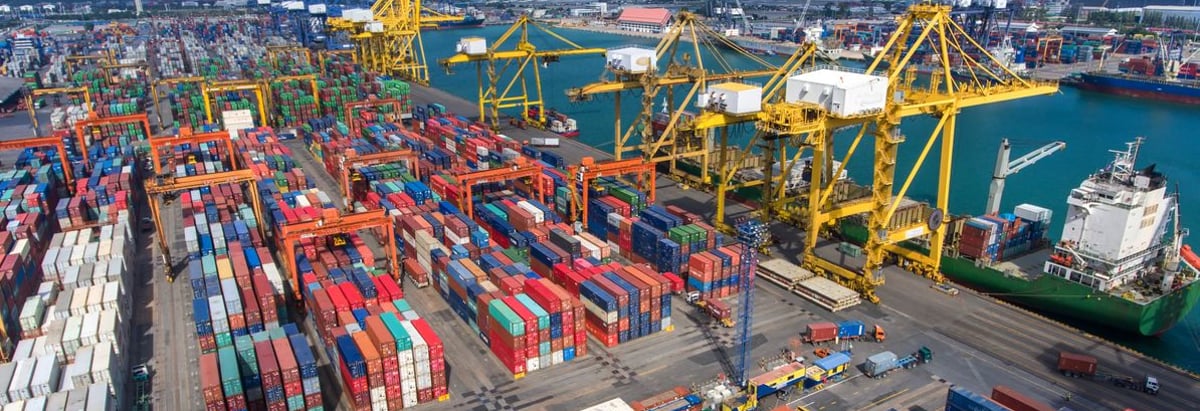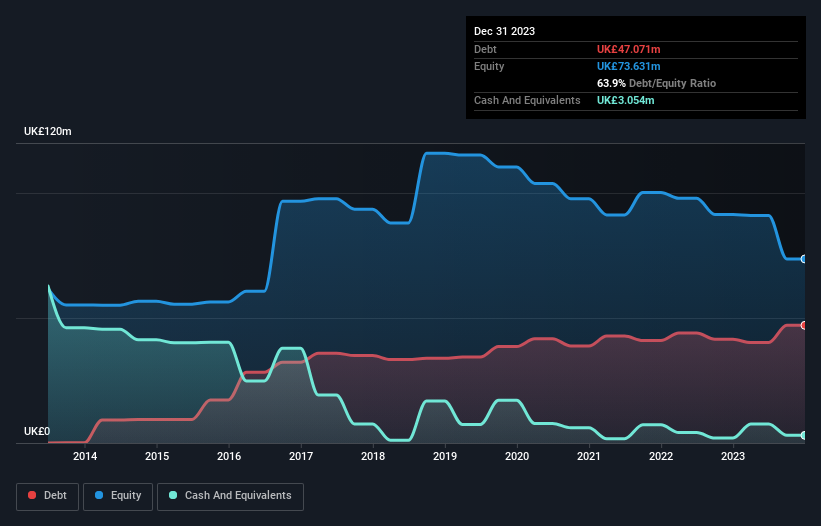- United Kingdom
- /
- Infrastructure
- /
- AIM:MPL
Is Mercantile Ports & Logistics (LON:MPL) Using Debt In A Risky Way?

Warren Buffett famously said, 'Volatility is far from synonymous with risk.' When we think about how risky a company is, we always like to look at its use of debt, since debt overload can lead to ruin. We can see that Mercantile Ports & Logistics Limited (LON:MPL) does use debt in its business. But the real question is whether this debt is making the company risky.
When Is Debt Dangerous?
Generally speaking, debt only becomes a real problem when a company can't easily pay it off, either by raising capital or with its own cash flow. Ultimately, if the company can't fulfill its legal obligations to repay debt, shareholders could walk away with nothing. However, a more frequent (but still costly) occurrence is where a company must issue shares at bargain-basement prices, permanently diluting shareholders, just to shore up its balance sheet. Of course, plenty of companies use debt to fund growth, without any negative consequences. When we examine debt levels, we first consider both cash and debt levels, together.
Check out our latest analysis for Mercantile Ports & Logistics
What Is Mercantile Ports & Logistics's Net Debt?
As you can see below, at the end of December 2023, Mercantile Ports & Logistics had UK£47.1m of debt, up from UK£41.5m a year ago. Click the image for more detail. However, it does have UK£3.05m in cash offsetting this, leading to net debt of about UK£44.0m.

How Healthy Is Mercantile Ports & Logistics' Balance Sheet?
The latest balance sheet data shows that Mercantile Ports & Logistics had liabilities of UK£15.5m due within a year, and liabilities of UK£37.9m falling due after that. On the other hand, it had cash of UK£3.05m and UK£18.5m worth of receivables due within a year. So its liabilities outweigh the sum of its cash and (near-term) receivables by UK£31.9m.
The deficiency here weighs heavily on the UK£7.84m company itself, as if a child were struggling under the weight of an enormous back-pack full of books, his sports gear, and a trumpet. So we definitely think shareholders need to watch this one closely. At the end of the day, Mercantile Ports & Logistics would probably need a major re-capitalization if its creditors were to demand repayment. There's no doubt that we learn most about debt from the balance sheet. But it is future earnings, more than anything, that will determine Mercantile Ports & Logistics's ability to maintain a healthy balance sheet going forward. So if you're focused on the future you can check out this free report showing analyst profit forecasts.
In the last year Mercantile Ports & Logistics wasn't profitable at an EBIT level, but managed to grow its revenue by 12%, to UK£5.5m. We usually like to see faster growth from unprofitable companies, but each to their own.
Caveat Emptor
Over the last twelve months Mercantile Ports & Logistics produced an earnings before interest and tax (EBIT) loss. Its EBIT loss was a whopping UK£5.2m. If you consider the significant liabilities mentioned above, we are extremely wary of this investment. That said, it is possible that the company will turn its fortunes around. But we think that is unlikely, given it is low on liquid assets, and burned through UK£1.6m in the last year. So we consider this a high risk stock and we wouldn't be at all surprised if the company asks shareholders for money before long. There's no doubt that we learn most about debt from the balance sheet. But ultimately, every company can contain risks that exist outside of the balance sheet. For example Mercantile Ports & Logistics has 5 warning signs (and 2 which are a bit concerning) we think you should know about.
Of course, if you're the type of investor who prefers buying stocks without the burden of debt, then don't hesitate to discover our exclusive list of net cash growth stocks, today.
If you're looking to trade Mercantile Ports & Logistics, open an account with the lowest-cost platform trusted by professionals, Interactive Brokers.
With clients in over 200 countries and territories, and access to 160 markets, IBKR lets you trade stocks, options, futures, forex, bonds and funds from a single integrated account.
Enjoy no hidden fees, no account minimums, and FX conversion rates as low as 0.03%, far better than what most brokers offer.
Sponsored ContentNew: Manage All Your Stock Portfolios in One Place
We've created the ultimate portfolio companion for stock investors, and it's free.
• Connect an unlimited number of Portfolios and see your total in one currency
• Be alerted to new Warning Signs or Risks via email or mobile
• Track the Fair Value of your stocks
Have feedback on this article? Concerned about the content? Get in touch with us directly. Alternatively, email editorial-team (at) simplywallst.com.
This article by Simply Wall St is general in nature. We provide commentary based on historical data and analyst forecasts only using an unbiased methodology and our articles are not intended to be financial advice. It does not constitute a recommendation to buy or sell any stock, and does not take account of your objectives, or your financial situation. We aim to bring you long-term focused analysis driven by fundamental data. Note that our analysis may not factor in the latest price-sensitive company announcements or qualitative material. Simply Wall St has no position in any stocks mentioned.
Have feedback on this article? Concerned about the content? Get in touch with us directly. Alternatively, email editorial-team@simplywallst.com
About AIM:MPL
Mercantile Ports & Logistics
Develops, owns, and operates port and logistics facilities in India.
Moderate and slightly overvalued.


